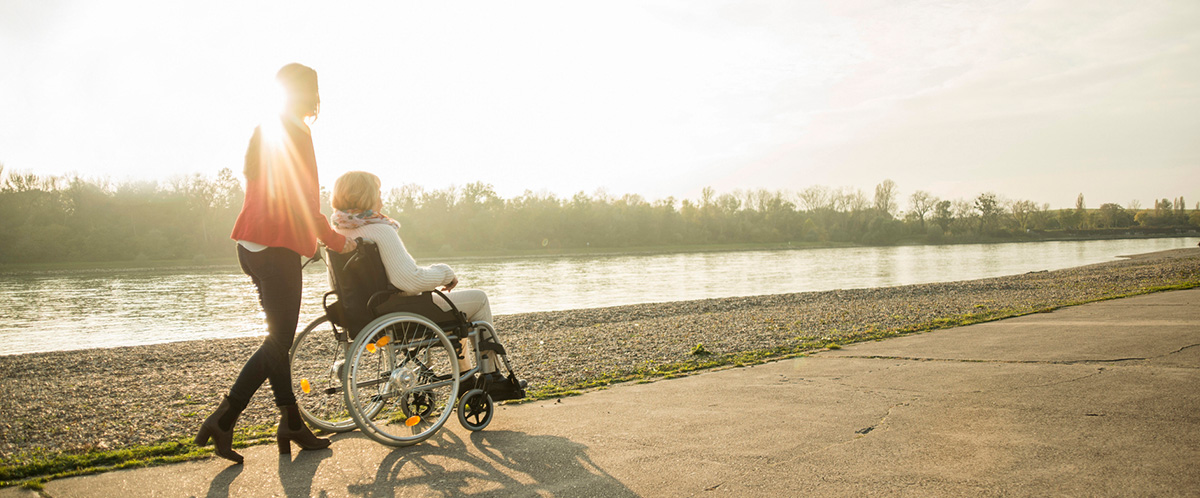Chronic pain impacts more than just those who experience it firsthand. Taking care of those who experience pain day in and day out is as taxing as it can be rewarding. Living with someone with chronic pain brings new challenges into a household dynamic that can be difficult to navigate.
6 ways to care for someone living with chronic pain
Here are some tips on caring for someone with chronic pain—and caring for yourself along the way.
1. believe them
An important thing you can do for someone living with chronic pain is believe them when they say their pain is real. Chronic pain is an invisible ailment that can be hard to identify in others.
Asking about their pain and working to grasp its impact could help you better relate to what they are going through. We may never know just what chronic pain does to a person—as each experience is unique—but putting in the effort to empathize rather than sympathize could make a difference.
Once you establish that trust, it may be easier for the person in pain to accept your help and support as they navigate through their journey to relief. Advocating for someone with chronic pain is easier when it stems from a place of respect and understanding.
2. address their physical needs
When living with chronic pain, even the smallest tasks can be daunting. It’s important to make sure that the physical spaces where your loved one spends their time are catered to their needs and habits.
Make sure essentials are within reach and at a level where they can be easily accessed. Toiletries, groceries and medications should be stored where no one has to reach too high or bend too low if mobility is a challenge. Come up with a plan for easy organization so that it’s fast for you to find what they need when you’re around, and simple for them to do the same when you’re unavailable.
Often, chronic pain leads to lots of downtime spent in bed. Bedside organizers are helpful for making sure that all needed items are within reach when a person is sequestered to their bedroom. Books, remotes, medication, tissues, eye masks and more can all be kept close to eliminate the need to move around and potentially further agitate a body in pain.
3. consider their barriers
After everything is situated properly on the home front, it’s time to tackle other factors in their environment. Do they live close to their doctors, their physical therapists, their pharmacy or grocery store? Are they able to drive or work?
Whether it’s food delivery, meal-prep kits or mail-order medication, figure out a way to ease barriers to getting things done. It may be helpful to identify days that you can run errands for them or help them schedule doctor appointments for days when they need someone to take them to and from hospitals or clinics.
4. advocate for their best interests
Doctor appointments can be overwhelming for anyone, and it’s easy to get wrapped up in the moment. When that happens, a person may forget to ask questions or leave the office feeling like they don’t understand all their options.
When it comes to caring for someone you’re close to, offer to attend their appointments with them. Take notes. Ask questions. Make sure that their pain is taken seriously, and not dismissed.
Partner with your loved one to research potential solutions or identify opportunities to meet with new and emerging care teams.
5. manage financial expectations
Chronic pain may lead to a significant financial burden for those who experience it. As a caretaker, it may be helpful to work with your loved one to comprehend their medical bills if they have questions or see if there is some other way you can support them as they navigate their financial needs.
Insurance can be tricky, especially when lots of specialists are involved. If your loved one needs help, most providers can connect you with financial counselors who specialize in medical expenses.
Try to plan ahead so nothing takes you by surprise.
6. focus on emotional needs
It’s good for both you and the person you care for to maintain connection with the outside world. Those living with chronic pain may have a desire to hide away from friends and loved ones in an effort to not let their pain impact the lives of others. There is a strong correlation between chronic pain and mental health disorders. Help them to see how important they are to you—and how important it is to maintain a positive outlook while facing troubles caused by poor physical health.
Continue to invite them to things, continue to include them. Small gestures like an invitation are a great way to let them know they are cared for.
Try not to lose sight of yourself as a person outside of the caregiver role. Make sure that you are taking time for yourself to do the things that bring you joy. You’re best suited to help others when you help yourself first.
chronic pain isn’t one size fits all
Sometimes, chronic pain is caused by nerve damage. This type of chronic pain may be repairable. To learn more about nerve pain, check out our nerve pain 101 page.
Could your loved one’s chronic pain be the result of nerve damage? Take the quiz with them to see if they’re a potential candidate for nerve repair.
Resources:
- https://www.neuromodulation.abbott/us/en/caregivers/becoming-caregiver/chronic-pain.html
- https://training.mmlearn.org/blog/caring-for-someone-with-chronic-pain-tips-for-elder-caregivers
- https://www.practicalpainmanagement.com/patient/treatments/mental-and-emotional-therapy/6-ways-be-friend-friend-living-chronic-pain
- https://www.bonejoint.net/blog/how-can-i-support-a-family-member-who-suffers-from-chronic-pain/
- https://www.southsidepainspecialists.com/supporting-the-ones-you-love-who-have-chronic-pain/
- https://www.health.qld.gov.au/news-events/news/caring-for-someone-with-chronic-pain
- https://www.pathways.health/how-you-can-help-your-loved-one-with-chronic-pain/
- https://www.neurosurg.org/articles/taking-care-of-a-person-suffering-from-chronic-pain
